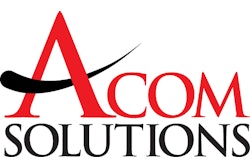40 percent of financial, treasury execs plan to increase use of commercial payment cards, Visa research finds
San Francisco — November 8, 2004 — Just over half (51 percent) of financial executives plan to reduce their organization's reliance on checks as a form of commercial payment, and 40 percent plan to increase their use of commercial payment cards, according to the results of a new survey conducted by Visa USA.
Responses to Visa's second annual cash management survey of several hundred financial and treasury executives from more than 20 industries indicate that these corporate leaders increasingly believe that commercial payment cards play a very important role in almost every aspect of the cash management process. Some key activities companies hope will reduce costs and boost operating efficiency include the increased use of electronic payments through cards and the elimination of paper checks and invoices.
While few corporate chief financial officers (CFOs), treasurers and controllers find their current cash flow and cash management processes to be highly efficient, the survey findings indicated some improvement in achieving greater process efficiency. Just 9 percent of respondents in 2003 rated their cash flow management process as "very efficient," but that figure increased to 13 percent this year.
In addition, a growing number of financial executives view the introduction of new company policies and technological advancements as having the greatest impact on improving their ability to more effectively manage cash flow. Two-thirds (66 percent) of respondents said changes in company policy have had at least a significant impact on the cash management process, and nearly as many (58 percent) cited changes in technology as having at least a significant impact. A majority (54 percent) said changes in corporate governance policies or other regulatory issues have had a significant to major impact on their company's ability to manage cash flow.
Thirty percent said changes in technology have most positively affected their ability to manage cash flow, followed by changes in company policies (27 percent). In addition, a majority of respondents said that changes in technology are expected to have one of the greatest impacts on cash management in the future, indicating technology investment may be a front-burner issue in the months ahead.
Elsewhere, the survey showed that Corporate America's overall satisfaction with commercial payment cards is also increasing. Of those respondents who indicated that they use card programs for collections and disbursements, 70 percent said they were somewhat or very satisfied, up from 55 percent in 2003.
"We're encouraged by the continued and growing satisfaction among commercial card users," said Mike Dreyer, senior vice president for commercial solutions at Visa USA. "Clearly, more companies recognize the benefits that really set commercial cards apart from other payment methods, from reducing administrative costs to enhancing the use transaction data."
The survey found that commercial payment cards were used by 34 percent of respondents for an average of 22 percent of their total commercial payments. Most respondents recognized the cards' value in each step in the cash management process, even more so than last year:
"This annual survey helps us to track trends in the attitudes of corporate financial executives regarding their cash management processes and to aid our member financial institutions in meeting the needs of the commercial payments marketplace," said Dreyer. "It's encouraging to see that low satisfaction with paper-based payments like checks is leading companies to pursue alternatives like commercial payments cards. Through the electronification of commercial payments, Corporate America will realize incremental benefits from an integrated e-procurement process and detailed transaction information essential to more efficient cash management."
San Francisco — November 8, 2004 — Just over half (51 percent) of financial executives plan to reduce their organization's reliance on checks as a form of commercial payment, and 40 percent plan to increase their use of commercial payment cards, according to the results of a new survey conducted by Visa USA.
Responses to Visa's second annual cash management survey of several hundred financial and treasury executives from more than 20 industries indicate that these corporate leaders increasingly believe that commercial payment cards play a very important role in almost every aspect of the cash management process. Some key activities companies hope will reduce costs and boost operating efficiency include the increased use of electronic payments through cards and the elimination of paper checks and invoices.
While few corporate chief financial officers (CFOs), treasurers and controllers find their current cash flow and cash management processes to be highly efficient, the survey findings indicated some improvement in achieving greater process efficiency. Just 9 percent of respondents in 2003 rated their cash flow management process as "very efficient," but that figure increased to 13 percent this year.
In addition, a growing number of financial executives view the introduction of new company policies and technological advancements as having the greatest impact on improving their ability to more effectively manage cash flow. Two-thirds (66 percent) of respondents said changes in company policy have had at least a significant impact on the cash management process, and nearly as many (58 percent) cited changes in technology as having at least a significant impact. A majority (54 percent) said changes in corporate governance policies or other regulatory issues have had a significant to major impact on their company's ability to manage cash flow.
Thirty percent said changes in technology have most positively affected their ability to manage cash flow, followed by changes in company policies (27 percent). In addition, a majority of respondents said that changes in technology are expected to have one of the greatest impacts on cash management in the future, indicating technology investment may be a front-burner issue in the months ahead.
Elsewhere, the survey showed that Corporate America's overall satisfaction with commercial payment cards is also increasing. Of those respondents who indicated that they use card programs for collections and disbursements, 70 percent said they were somewhat or very satisfied, up from 55 percent in 2003.
"We're encouraged by the continued and growing satisfaction among commercial card users," said Mike Dreyer, senior vice president for commercial solutions at Visa USA. "Clearly, more companies recognize the benefits that really set commercial cards apart from other payment methods, from reducing administrative costs to enhancing the use transaction data."
The survey found that commercial payment cards were used by 34 percent of respondents for an average of 22 percent of their total commercial payments. Most respondents recognized the cards' value in each step in the cash management process, even more so than last year:
- 62 percent (up 2 percentage points from 2003) believed they were relevant or very relevant for cash disbursements;
- 53 percent (up 5 percentage points from 2003) believed they were relevant or very relevant for short-term money management and the collection and application of receivables; and,
- 48 percent (up 5 percentage points from 2003) believed they were relevant to very relevant for cash positioning and forecasting.
- Visibility into payables and receivables (75 percent, up 2 percentage points from 2003);
- Online access to payment and invoice-related detail (77 percent, up seven percent from 2003); and,
- Automated information reporting and back-end integration (70 percent, up two percent from 2003).
"This annual survey helps us to track trends in the attitudes of corporate financial executives regarding their cash management processes and to aid our member financial institutions in meeting the needs of the commercial payments marketplace," said Dreyer. "It's encouraging to see that low satisfaction with paper-based payments like checks is leading companies to pursue alternatives like commercial payments cards. Through the electronification of commercial payments, Corporate America will realize incremental benefits from an integrated e-procurement process and detailed transaction information essential to more efficient cash management."








